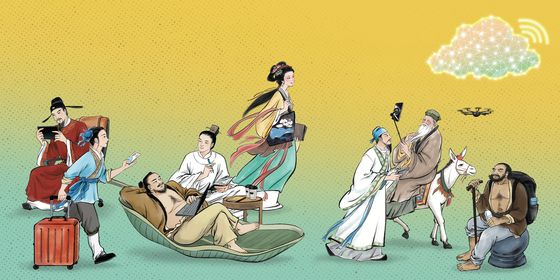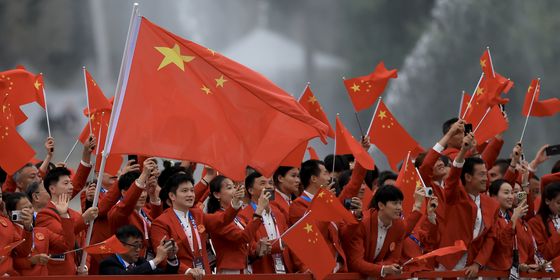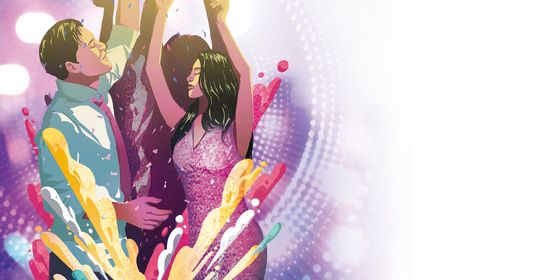A character to dress up any occasion
In his ballad “Flowers and Jade Trees in the Back Courtyard,” Chen Shubao, the corrupt last emperor of the Northern and Southern dynasties (420 – 589), boasted that his concubines’ “new garments and good looks could fell a city” (新装艳质本倾城). But according to folk wisdom, the clothing (装, zhuāng) played a bigger role than the person. As expressed by the Chinese proverb, “[Appearance is] 30 percent looks and 70 percent adornment” (三分靠长相,七分靠打扮).
The character 装 , the key to beauty, gets its pronunciation from the radical 壮 (zhuàng, strong) at the top, and its meaning from 衣 (yī, clothing) below. The character originally referred to packed luggage, and this meaning has remained in several idioms, including 轻装上阵 (qīngzhuāng shàngzhèn, “go into battle with light baggage”), meaning to approach a task without mental burdens, and 整装待发 (zhěngzhuāng dàifā, “all packed and ready to go”). 装 can also refer to other packing-related actions, such as 装车 (zhuāngchē, “load a truck”) or 装满 (zhuāngmǎn, “fill up”).
Later, 装’s definition was extended to clothing—baggage one outfits oneself with in daily life. Phrases with 装 in the suffix are abundant in the fashion industry, describing various types of clothing such as 军装 (jūnzhuāng, military uniform), 童装 (tóngzhuāng, children’s wear), 泳装 (yǒngzhuāng, swimwear), and 时装 (shízhuāngg, trendy clothing). Outlandish get-ups that don’t conform to any fashion norms are called 奇装异服 (qízhuāng yìfú).
Besides the clothes themselves, the act of dressing up is also referred to with the character 装, as in 装扮新娘 (zhuāngbàn xīnniáng, “dressing up the bride”), and 为了抓住罪犯,警察化装成一个乞丐 (Wèi le zhuāzhù zuìfàn, jǐngchá huàzhuāng chéng yí gè qǐgài, “In order to arrest the criminal, the policeman disguised himself as a beggar”). It’s not just humans that require decking out, either: 装修 (zhuāngxiū, renovate) and 装点 (zhuāngdiǎn, decorate) refer to outfitting one’s house for habitation; 安装 (ānzhuāng) means to install or assemble an object, such as 安装电话 (ānzhuāng diànhuà, “install a telephone”).
Although there’s still a divide between menswear and women’s fashion, cross-dressing is an ancient and surprisingly respected tradition in performing arts. In Peking opera, for example, female lead roles, known as dan, were traditionally played by men, as women were forbidden from learning the art. The four greatest dan performers of the 20th century—Mei Lanfang, Shang Xiaoyun, Cheng Yanqiu, and Xun Huisheng—were all men who convincingly masqueraded (化装, huàzhuāng) as heroines using makeup and 戏装 (xìzhuāng, stage costumes).
Compared with 男扮女装 (nán bàn nǚzhuāng, men in drag), 女扮男装 (nǚ bàn nánzhuāng, women in a men’s disguises) were less common, but did play a key role in the plot of two classic folk tales. Hua Mulan, the military heroine of a self-titled ballad of the Northern and Southern dynasties, who disguised herself as a man and takes up 武装 (wǔzhuāng, arms) in her elderly father’s stead. Her story was the basis of the 1998 Disney animated movie Mulan and its upcoming live-action adaptation.
In the Eastern Jin tale “The Butterfly Lovers,” meanwhile, Zhu Yingtai disguises herself as a man to study in an academy in Hangzhou, eventually becoming star-crossed lovers with her male classmate Liang Shanbo. At first, Zhu 假装 (jiǎzhuāng, pretends) to set Liang up with her “sister.”
装 can apply to not only covering up physical appearance, but also feelings and fact. It can work as a verb by itself—as in 他装出很爱我的样子 (Tā zhuāng chū hěn ài wǒ de yàngzi, “He pretended to love me deeply”)—or describe specific pretenses, such as 装糊涂 (zhuāng hútu, “playing dumb”), or 装腔作势 (zhuāngqiāng zuòshì, “putting on airs of importance”).
Not all pretense is immoral, and sometimes it’s necessary to dress up the truth. A well-known story tells how Warring States strategist Sun Bin, author of The Art of War, had to 装疯卖傻 (zhuāngfēng màishǎ, “feign madness and act like an idiot”) to save his life. Due to his genius, Sun was framed for treason by a jealous ex-schoolmate, General Pang Juan of the State of Wei, and had his legs chopped off at the knee as punishment. Sun then pretended to be mad—talking nonsense, living in a pigsty, and eating manure—to avoid further persecution until he could flee to the State of Qi, eventually helping it defeat the Wei.
Salespeople also know the value of 装: Just as good-looking people are more popular, products sell better with clever 包装 (bāozhuāng, packaging). For this meaning, 装 can be coupled with different containers, such as 瓶装 (píngzhuāng, “bottled”) and 盒装 (hézhuāng, “box-packed”).
Of course, it’s unwise to focus on the decoration while overlooking the essentials—as indicated by the fate of Chen Shubao, who was reduced to hiding in a well from the conquering Sui dynasty and died an alcoholic in the Sui capital. On the other hand, it’s necessary for people to take good care of their appearance. As another proverb cautions, 人靠衣装,佛靠金装 (Rén kào yīzhuāng, fú kào jīnzhuāng. “People rely on their clothes, just as Buddha relies on gold plating to shine”).
On the Character: 装 is a story from our issue, “China Chic.” To read the entire issue, become a subscriber and receive the full magazine.













